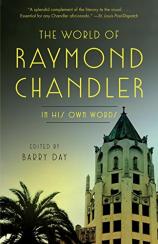The World of Raymond Chandler: In His Own Words
Review
The World of Raymond Chandler: In His Own Words
For all his fame, Raymond Chandler had a relatively slight output (seven slim novels, a couple dozen short stories). But that hasn't prevented a steady stream of biographies, literary studies and adaptations of his work. At this point, more words probably have been written about the creator of Philip Marlowe than he wrote himself. Barry Day's THE WORLD OF RAYMOND CHANDLER, consisting mostly of excerpts from Chandler's letters, stories and novels, with some connective commentary in between, is the latest in this line of books about the man who invented Southern California noir.
Chandler, who was born in Chicago and raised in England, was always an outsider --- a “man with no home,” according to Day, who begins with a cursory overview of Chandler's first 40 years. He traces his brief career in the British Civil Service, his early, mostly failed, literary efforts, and his service in World War I. As he does throughout, Day lets Chandler speak for himself whenever possible, quoting liberally from his letters to draw a picture of a man struggling to find his way in the world. And it certainly took Chandler some time to find his path --- he didn't publish his first novel until his 40s, after being fired from his job at a Los Angeles oil company because of his alcoholism.
"The book is at its best when Chandler speaks through his letters, where the man that emerges is by turns supremely confident...and dismissive of his talents... a compelling, if incomplete, portrait of a writer of lasting influence."
After establishing the outlines of Chandler's biography, Day shifts focus to his career as a writer. Despite claiming that he had “absolutely no talent” for fiction when he started out, Chandler was a quick study, and it didn't take him long to startturning the hard-boiled detective story into genuine literature. But while Chandler elevated pulp mysteries, he also struggled to work within the constraints of the often-derided genre, lamenting that “[W]hen I write something that is tough and fast and full of mayhem and murder, I get panned for being tough and fast and full of mayhem, and then when I try to tone down a bit and develop the mental and emotional side of the situation, I get panned for leaving out what I was panned for putting in the first time.”
The book is packed with interesting tidbits. Humphrey Bogart may be the iconic Marlowe now, but Chandler favored a different actor for the part: Cary Grant. He once considered abandoning mysteries and trying his hand at fantasy fiction. He owned a tyrannical cat named Taki (half-a-dozen pages are devoted to Chandler's musings on his beloved pet). Especially interesting are his thoughts on other writers. He dismisses James M. Cain as “a faux naïf, a Proust in greasy overalls,” even though he later earned an Academy Award for his adaptation of Double Indemnity. But he admires F. Scott Fitzgerald, who he argues would have been a great writer if he hadn't been an alcoholic. It's a poignant observation, given Chandler's own struggle with drinking and the way it marred his last novel, PLAYBACK, and the unfinished POODLE SPRINGS.
Day's admiration for his subject's talent is clear. He has diligently combed through Chandler's oeuvre and doesn't hesitate to display the gems he's found, making a convincing case that “it wasn't his plots or supporting characters that set him apart. It was his use of language.” Unfortunately, Day's enthusiasm for Chandler's ability to craft an evocative sentence sometimes goes overboard. Chandler may have been the master of the simile, but rather than give a handful of the best examples of his efforts, Day packs page upon page with sentences divorced from their context. It's simply overwhelming, and Chandler's clever way with words starts to seem trite. It also illustrates a larger problem with the book: an author so enamored of his subject that he is blind to the weaker aspects of his work. Day only briefly touches on Chandler's casual homophobia, offering the unsatisfactory observation that “We are now never likely to know whether he was a genuine homophobe.” Chandler's often harsh treatment of his female characters (the majority of his killers were women) receives a bit more attention, though Day doesn't delve too deeply into what motivated his persistent sexism.
Resting uneasily between biography and literary study, THE WORLD OF RAYMOND CHANDLER offers compelling evidence of Chandler's talent as a writer, though anyone really wanting to get a feel for his style would be better off picking up a copy of THE LONG GOODBYE. The book is at its best when Chandler speaks through his letters, where the man that emerges is by turns supremely confident (“I am the best there is in my line and the best there has ever been”) and dismissive of his talents (“What I write that sells is not at all the sort of thing I really want to write”). Day's book may not offer much in the way of new insight, but it's still a compelling, if incomplete, portrait of a writer of lasting influence.
Reviewed by Megan Elliott on December 12, 2014
The World of Raymond Chandler: In His Own Words
- Publication Date: November 10, 2015
- Genres: History, Literature, Nonfiction
- Paperback: 272 pages
- Publisher: Vintage
- ISBN-10: 0804170487
- ISBN-13: 9780804170482




